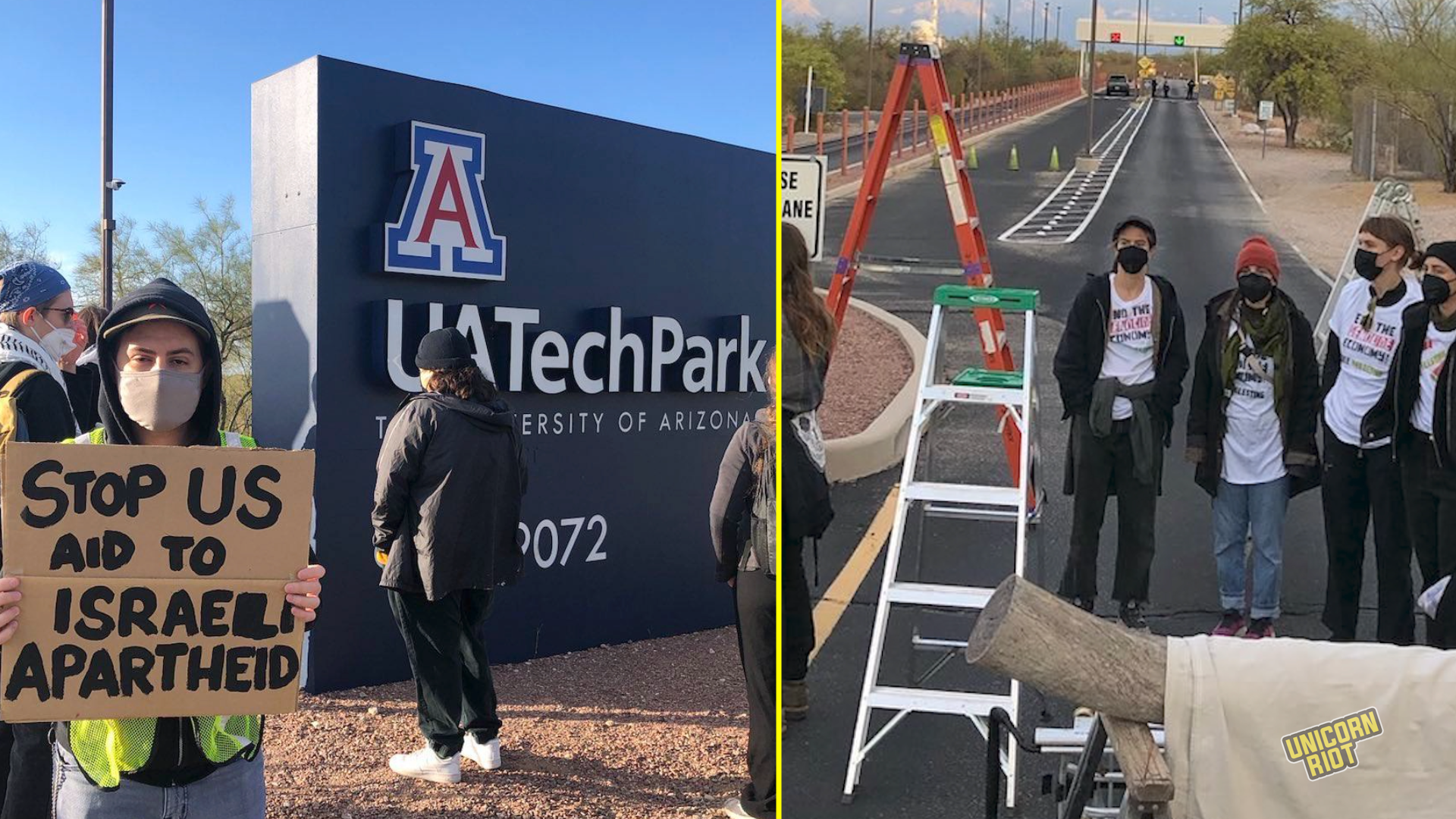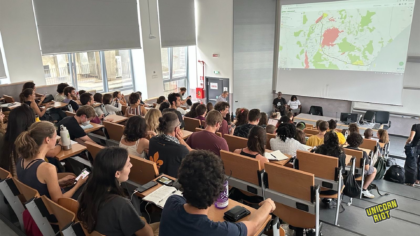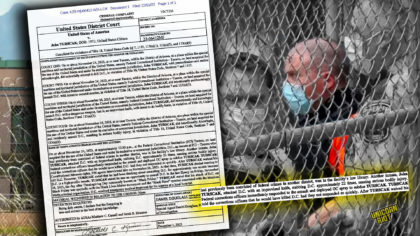Blockade Protest Disrupts Raytheon at University of Arizona Tech Park
Tucson, AZ — The morning commute was pure chaos for Raytheon employees and others reporting for work at the University of Arizona (UA) Tech Park on Thursday, November 30 as over 100 people participated in a blockade and rally at the facility. The action was organized to highlight weapons manufacturer Raytheon and the University of Arizona’s complicity in Israel’s ongoing bombardment of Gaza by creating munitions used to indiscriminately bomb civilian populations.
Beginning around 7:30 a.m., about 30 protesters went inside the grounds of the Tech Park campus, blockading both entrances to the Raytheon facility for about an hour and a half as workers zoomed in and out of the crowds staged at various entrances, desperately seeking a way to get to work.
Some Raytheon workers drove off road or over large curbs in their trucks to pass the ‘soft blockades’. Others slowly drove their vehicles into the crowd while others yelled obscenities and revved their engines threateningly. The crowd largely held their ground; a few passersby also cheered.
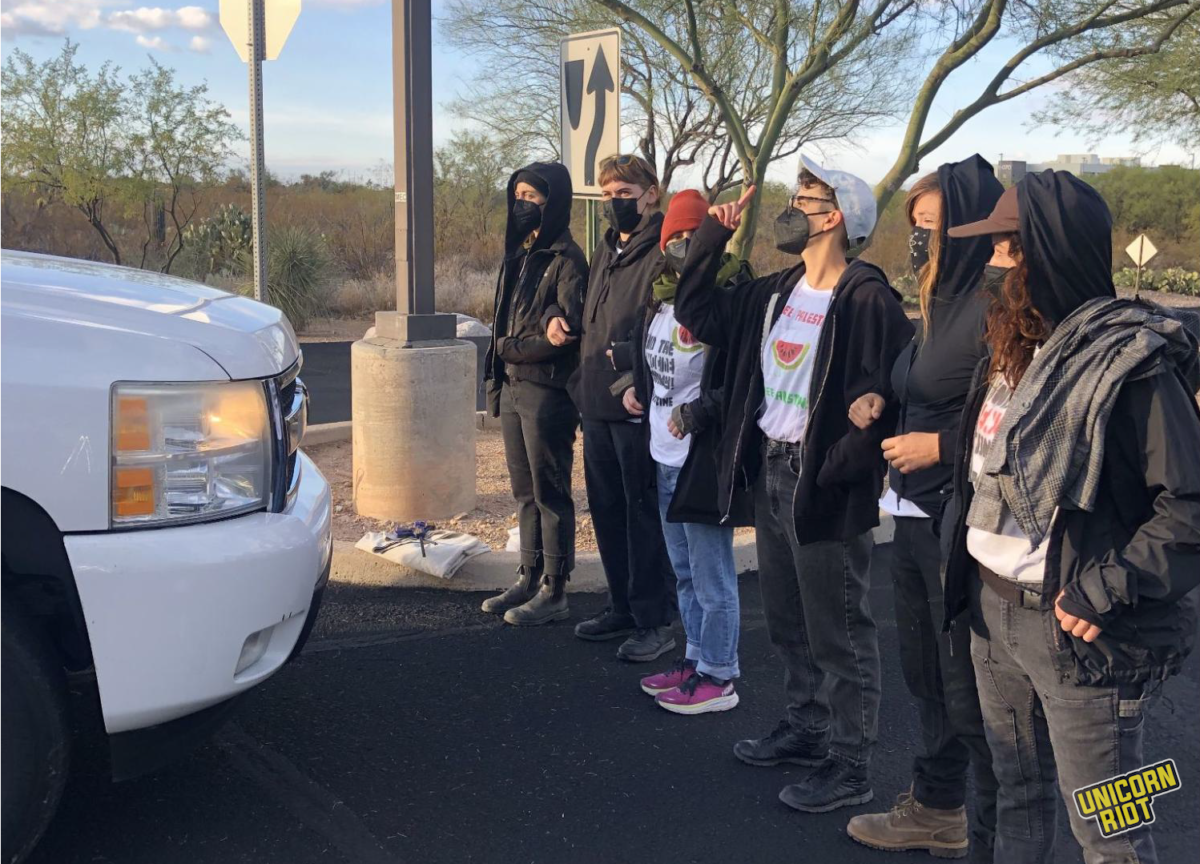
The blockaders linked arms behind ladders, cinder blocks and other debris they had piled in the road as they jumped out of trucks earlier that morning, quickly setting up about 100 yards in front of the guard station at Raytheon’s east entrance.
Protesters at Raytheon’s west entrance were able to drive their vehicles past the Raytheon check-point to set up another blockade there. The second group then linked arms, blocking the road until Sheriff’s deputies arrived to remove them one-by-one.
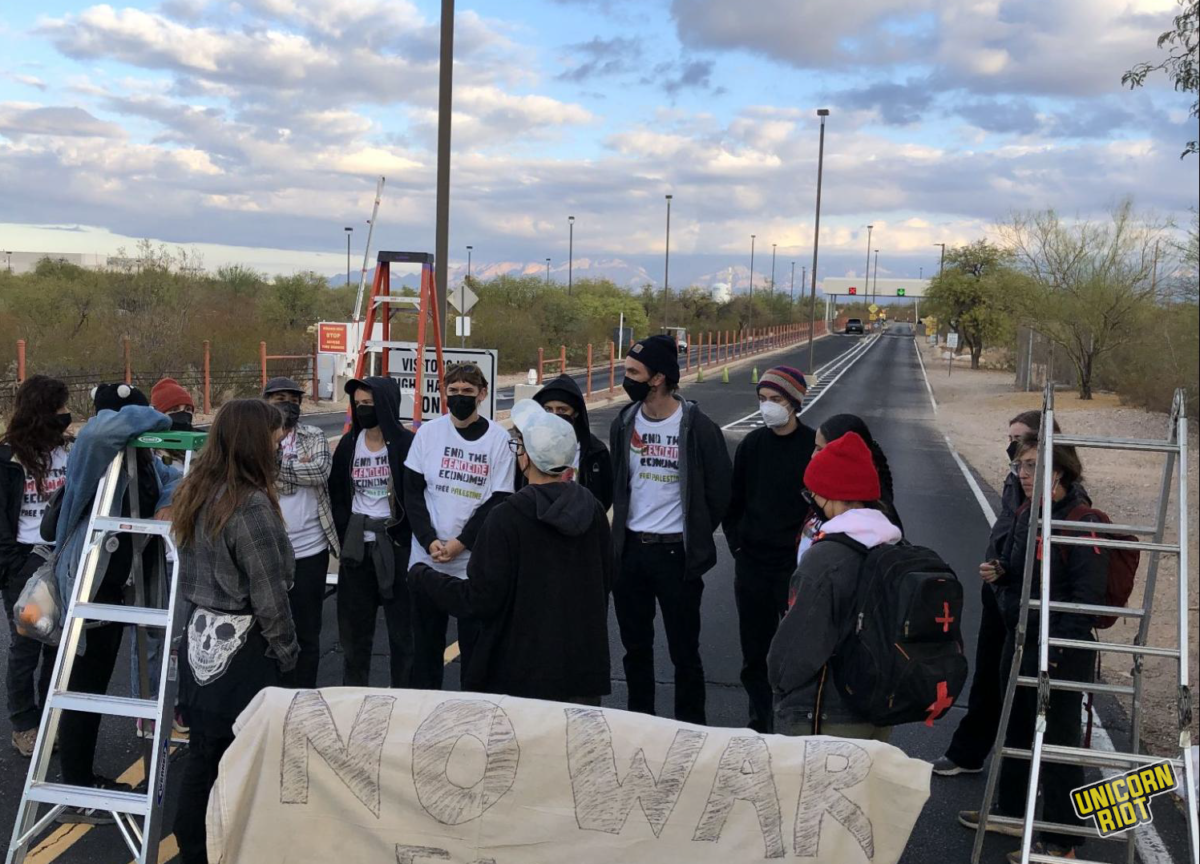
Pima County Sheriffs and Raytheon’s contracted Securitas guards seemed to be totally unprepared for the action, which was planned by a new coalition of Tucson-area groups and individuals calling themselves the Tucson Coalition for Palestine. The action was announced the day before with an unspecified location.
Sheriff’s deputies made no arrests until back-up arrived. In the meantime, they threatened and pleaded with participants to stop their disruptive protest and go home, to no avail.
Eventually, the Tucson Police Department and additional Sheriff’s deputies arrived on scene. In the end, 26 people were arrested, held for about two hours and released with citations for third degree misdemeanor trespassing charges. Those arrested walked out of the Pima County Sheriff’s San Xavier District Office after they were released and were met with cheers and applause from a waiting crowd of supporters.
One of those arrested was Alisa Reznick, a journalist with KJZZ, the Phoenix area NPR affiliate. Deputies from the Pima County Sheriff’s Department arrested Reznick as she was walking to her vehicle, attempting to comply with deputies’ orders to disperse. A Unicorn Riot contributor on scene was standing next to Reznick when she was arrested. Deputies handed the contributor Reznick’s camera and recording equipment, but did not place him under arrest.
The protest occurred at a campus operated by the University of Arizona that serves as a fusion center for tech businesses and the University.
The Tech Park hosts offices of Raytheon as well as IBM, CitiBank, Applied Energetics, Tucson Electric Power, the University of Arizona Center for Innovation, and many other companies (most of which have no connection to the weapons industry).
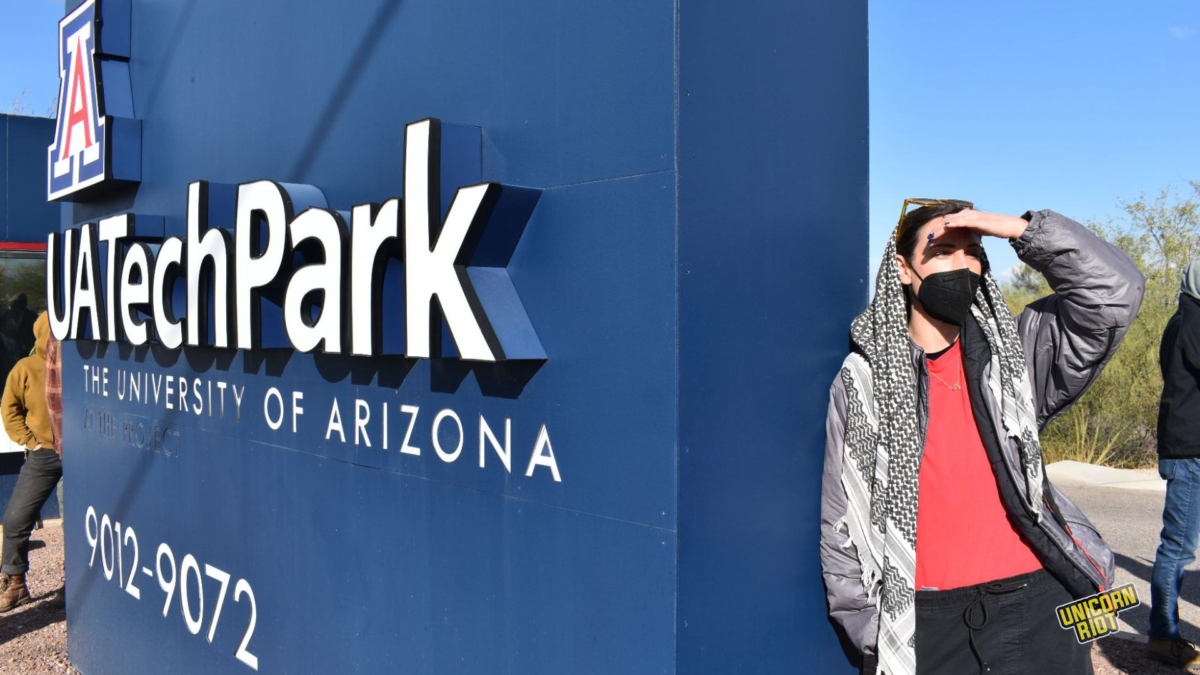
The blockade follows a series of other events and disruptions organized by the Tucson Coalition for Palestine this month, including a die-in at a different Tucson-area Raytheon facility at the beginning of the month.
The group also led an occupation of the University of Arizona College of Education office to protest the suspension of two professors for their in-class discussion of Israel’s bombardment of Gaza. The Nov. 30 blockade appears to be a significant escalation in tactics from the largely symbolic die-in earlier in the month. So far, group members had chosen to not get arrested at their actions and, until today, had not shut down Raytheon’s business operations.
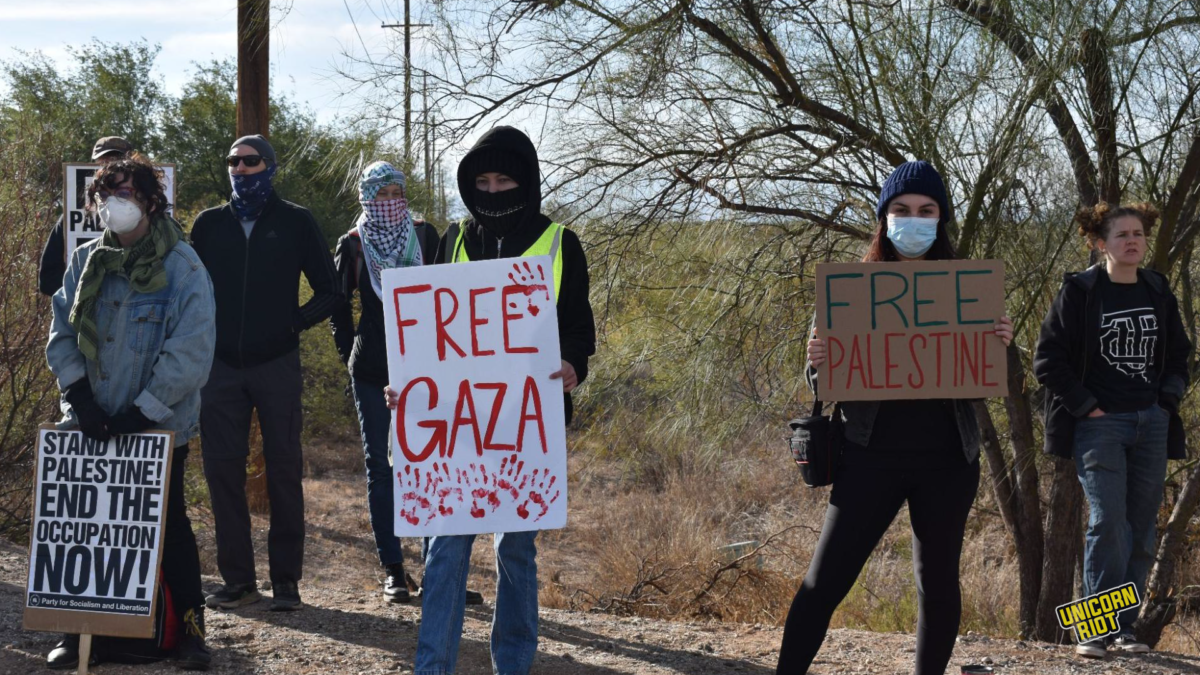
Weeks before and hundreds of miles away, a group of people successfully blockaded the Raytheon facility south of the Los Angeles International Airport, shutting down the facility for more than seven hours, according to reports from participants.
The University of Arizona and Raytheon are Tucson’s two largest employers and the public university is deeply intertwined with the bomb-building giant.
Raytheon’s parent corporation RTX Technologies is Tucson’s single largest employer with 12,000 local workers. Raytheon began supplying components to Israel’s Iron Dome missile system in 2014. RTX is the second largest weapons manufacturer in the U.S. with yearly revenue of over $67 billion.
Tech Parks Arizona not only operates as a hub for collaboration between weapons manufacturers and the public university, it is a major source of the initiative and innovation behind the continued militarization of the U.S.-Mexico border.
Through its program Global Advantage, which is operated by the University’s Center for Innovation, the University of Arizona actively recruits multinational arms manufacturers and tech companies and provides the logistical, legal and material support for them to base their operations in Southern Arizona.
Israeli tech and weapons giants are one of Global Advantage’s targets for recruitment. Like Gaza itself, the Southern Arizona borderlands offer such companies an ideal laboratory for testing and perfecting systems of surveillance and control, and the opportunities for synergistic linkage between the police, tech, military, and administrative operations of the two borderlands have proven extremely profitable.
In 2018, the Israeli weapons firm Elbit Systems acquired Arizona-based Universal Avionics in order to fortify its presence in the region. Elbit now contracts with Customs and Border Patrol (CBP) to build surveillance towers along the U.S. Mexico border, along with weapons system companies Anduril Industries and General Dynamics. Elbit has built 55 “integrated fixed towers” covering 200 miles of the U.S.-Mexico border.
The level of collaboration between the military-industrial complexes built up around the two borders has caused some commentators to refer to the resulting nexus as the “Palestine-Mexico border.”
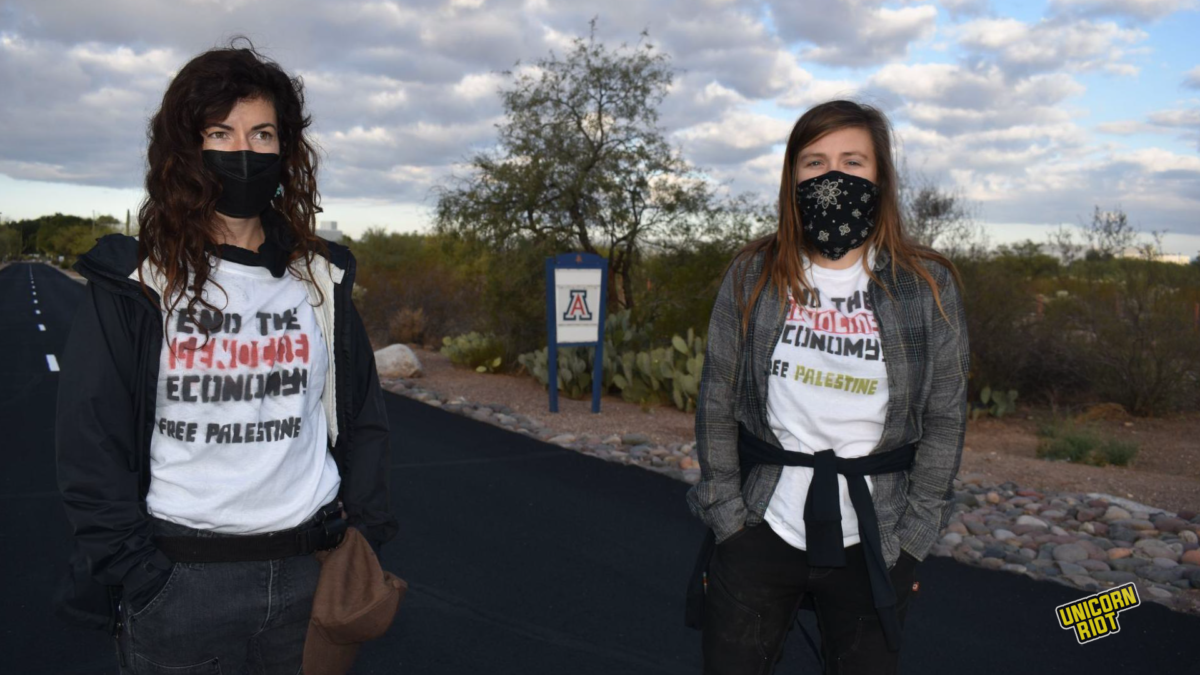
As Gabby Schivrone and Todd Miller pointed out in 2015, Global Advantage and the cross-border network it promotes, then, has the ironic role of fortifying borders for human and non-human animal life, both in Gaza/Israel and in Southern Arizona/Northern Mexico, while reducing the barriers to the cross-border flow of capital by weapons systems manufacturers.
In a 2017 interview with the Times of Israel, Bruce Wright, then-associate vice president of Tech Parks Arizona, explained that the project’s goal was to “foster an economy that is borderless and unconstrained.”
Since the Zapatistas first declared war in Southern Mexico in 1993, the increasing globalization of capital has been contested by a counter-globalization movement committed to building a different sort of international collaboration. That international solidarity can be seen in the current anti-war movement, in which Palestinian groups are engaging in active cross-border communication with those acting in solidarity around the world.
In a call for solidarity reminiscent of the Zapatistas and the combatants of the South African anti-apartheid struggle, a coalition of Palestinian trade unions put out a call earlier this month for people around the world to take direct action to block the flow of arms to Israel. “Let’s unite to block arms factories, urge unions to halt weapon production, and expose complicit universities,” the group Workers in Palestine wrote on Instagram.
The Tucson Coalition for Palestine is one of many groups around the U.S. mobilizing to answer this call since Israel began massacring thousands of Palestinian civilians in Gaza after the Hamas attack on October 7.
“I live in Tucson and I am extremely cognizant of the fact that the place I live is an epicenter of a genocide economy and a war economy,” said Tali Ginsburg, one of those arrested during the protest. “That has deep implications for what it means to live here. These are the corporations that are directly sending the bombs to Gaza that are killing civilians there. And so there’s an extremely direct connection.”
The Tucson Coalition for Palestine is composed of groups and individuals from a variety of backgrounds and political trajectories, including both Jews and Palestinians. Several of the organizers of the Nov. 30 event were Jewish and spoke about their experiences as anti-Zionist Jews.
“In this moment I am feeling extremely rooted in an anti-Zionist Jewish lineage,” said Ginsburg. “And I think that lineage right now extends across the country in the actions that we’re seeing led by anti-Zionist Jews, led by Palestinians, led by an upwelling of the left in the country right now that is saying no to this war economy on a mass scale.”
The organizing efforts of Jews working against the occupation of Palestine are frequently overlooked or intentionally written out of history by those seeking to equate anti-Zionism with anti-Semitism. But there is a long history of Jewish participation in anti-apartheid struggles, from South Africa to Palestine.
“I know that anti-Zionist Jews have been doing this work since before the state of Israel existed,” continued Ginsburg, “creating alternative Jewish communities and alternative Jewish politics, and I know that we will continue to do it long after the state crumbles.”
Related: Anti-Zionist Jews Hold Solidarity Shiva for Palestinian and Israeli Lives Lost
For more from Palestine and pro-Palestine protests, see our archives.
Follow us on X (aka Twitter), Facebook, YouTube, Vimeo, Instagram, Mastodon, Threads, BlueSky and Patreon.
Please consider a tax-deductible donation to help sustain our horizontally-organized, non-profit media organization:

